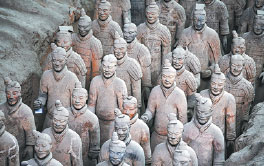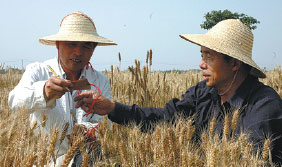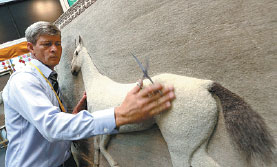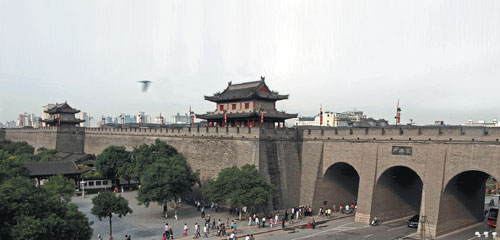Governor touts Silk Road growth
Updated: 2015-10-05 16:36
By Du Juan in Xi'an(China Daily USA)
|
||||||||
Editor's note: Xi'an, where the ancient Silk Road originated, is shifting from a capital known for its history and culture to a multifaceted city seeking opportunities provided by China's Belt and Road Initiative. Shaanxi province, where Xi'an is located, is building more economic ties to the world, especially to central Asian countries. It will host the Euro-Asia Economic Forum from Thursday to Saturday. China Daily talked recently with Lou Qinjian, the governor of Shaanxi, to learn more about the province's strategy and goals.
What do you think of Shaanxi's role as both the start of the ancient Silk Road and a key province in the Belt and Road Initiative?
Lou: The Belt and Road Initiative is an innovative creation that links the dreams for a better life among the people of the countries and regions along the new Silk Road. It will bring opportunities for peace and prosperity to the world.
Shaanxi province is taking this chance to start a new chapter of growth. At the beginning of the year, President Xi Jinping came to Shaanxi and commented on how the province has become an important front line in China's opening up to the West.
Shaanxi has established good relationships with countries and regions along the new Silk Road in terms of both commerce and culture.
What foundations has Shaanxi built with countries and regions along the new Silk Road?
Lou: Shaanxi is the cradle of new technology, buoyed by its rich talent resources developed at dozens of well-known universities. We are making efforts to turn these technologies into products and industries instead of just exporting them.
Based on the Belt and Road Initiative, we will accelerate cooperation on education, technology and industries with countries along the new Silk Road.
First, we will build a China-Russia high-tech industrial zone and a technology innovation port in order to improve cooperation between the two sides.
Second, Shaanxi will strengthen its cooperation with central Asian countries in the energy exploration, petrochemical, biomedical and electronic information industries.
Third, China's only national-level agriculture high-tech industrial zone in Shaanxi's Yangling district will provide support to central Asian countries in areas such as operation in dry lands and related equipment development.
Lastly, our universities will form alliances with central Asian countries to increase communication.
What do you expect from the coming Euro-Asia Economic Forum?
Lou: The Euro-Asia Economic Forum to be held in Xi'an from Thursday through Saturday has drawn attention from many countries. We have 2,008 registered guests so far, and more than 40 countries will send their ministerial-level officials to attend the forum.
Shaanxi has potential for cooperation in both traditional and emerging industries with the countries and regions along the new Silk Road. We have held an Investment Trade Forum for Cooperation between the East and West China for 17 years and it was upgraded to a Silk Road International Exposition for the past two. Now we are making efforts on holding a successful Euro-Asia Economic Forum, and I am sure there will be more trade agreements and fruitful communications through this platform.
In the past two years, Shaanxi has signed more than 100 cooperative project agreements with Central Asian countries in sectors such as infrastructure construction, geological prospecting, energy and agriculture.
For instance, the State-owned Shaanxi Coal and Chemical Industry Group Co built an oil refinery project in Kyrgyzstan, which is the biggest of its kind in that country. Shaanxi Yanchang Petroleum Group Co, a private energy company, invested in and developed 11 oil fields in Kyrgyzstan. China XD Group Corp established a regional service center in Uzbekistan. Next, we will accelerate aviation industrial park projects with Italy and Kyrgyzstan and try to attract more investment from other countries.
What advantages does Shaanxi offer?
Lou: Shaanxi is a province with rich energy resources such as coal and crude oil. We are working to persuade the Shanghai Cooperation Organization to set up its energy club in Shaanxi.
We are also working on cooperative deals for energy exploration and trade, and energy storage bases for the Silk Road Economic Belt.
The last time I went to Australia, they told me they would like companies in Shaanxi to help them on mineral prospecting because of the rich experience and technology that we have.
Shaanxi has been a national leader in exploration technology. I believe it is more beneficial for our companies and our foreign counterparts to participate in exploration rather than mere acquisitions for technology.
Shaanxi is determined to become the country's central transportation and logistics hub in an effort to improve the convenience of international trading. What's next in your plan?
Lou: China's economic structure is geared to meet the demand for improving people's lives, which will bring opportunities to Shaanxi. In the past, China was an export-oriented economy, which was beneficial for the coastal provinces. The new consumption-oriented economy has given Shaanxi a big chance to develop a logistics industry based on its geological advantage.
The government will use this opportunity to construct infrastructure to connect the country.
Shaanxi has invested more than 90 billion yuan ($14 billion) in transportation infrastructure over the past two years. So far, we have 5,000 km of expressways in the province. During the 13th Five-Year Plan period (2016-2020), we plan to build another 1,500 km of expressway and 3,500 km of railways.
We will cooperate with the China Railway Group, the nation's railway operator, to build Xinzhu station into the biggest logistics distribution center along the new Silk Road.
In terms of air transportation, we have 24 international airlines, a big improvement compared to previous years. Shaanxi is a big manufacturer of aircraft. However, we should raise our air service level, which still lags behind some other provinces, to maximum our central geological advantage.
In addition, the government is trying to make the province more convenient for international trade. We are seeking approval to establish a Silk Road free trade pilot zone. Consumers can now buy Australian milk powder in Xi'an. It may seem like a small thing, but it actually is significant because much work was needed to achieve this for a province that is far from either the coast or another country. I'm happy to see this progress.
How did Shaanxi attract Internet giant Alibaba to invest in the province and sign a strategic cooperation agreement in August, and what's next?
Lou: I am an old friend of Ma Yun, who is the founder of Alibaba Group. Since I worked for the Ministry of Industry and Information Technology for years, I've seen Alibaba's creation and growth.
Ma Yun didn't come to Shaanxi to invest when I became the governor of the province. For a businessman, it's not rational to make an investment decision based on personal involvement.
He brought his management team to Xi'an and signed the agreement with Shaanxi in August, which means that Shaanxi is ready for such an investment.
Mobile communication is developing rapidly in Shaanxi with 4G technology. The Internet speed in the province is good enough for cross-border e-commerce, which will provide opportunities to Internet companies such as Alibaba.
Samsung, the National Population and Family Planning Commission, National Weather Service and National Bureau of Statistics all chose Xi'an as the location of their data centers.
When we provide business opportunities to IT companies, they also bring good business models to the province. The benefits are mutual.
I heard a story, which impressed me, about how e-commerce will change farmers' lives. In the small county of Shanyang, in Shaanxi, farmers are selling agricultural products online. Their organic eggs can be sold at 36 yuan a kilogram, which greatly improved the farmers' incomes. The local government spared a building and hired college students to help those farmers set up online stores. The project is win-win. Farmers get their products sold at a better price and college graduates work at a startup business, which can equally fulfill their dreams.
As a province with a long cultural history, how will Shaanxi increase cultural exchanges with other countries?
Lou: We have established sister relationships with countries, including Kazakhstan, Kyrgyzstan, Uzbekistan and Turkmenistan. Malaysia and Cambodia will set up consular offices in Xi'an.
We have successfully held the first Xi'an Silk Road International Film Festival, International Silk Road Art Festival and Silk Road Tourism Expo.
The government will continue to actively increase the platforms for communication between people from different countries. We will provide support for literary and artistic works. Meanwhile, we will offer financial support to build more venues.
Xi'an is a well-known ancient city and we have a rich experience in preservation of cultural relics, which we can share with other countries.
We noticed an increasing number of companies in Shaanxi are investing in central Asian countries. What do you think about their overseas investments?
Lou: Indeed, many of our companies are going overseas to expand their businesses, especially in countries along the new Silk Road. As far as I know, private companies in Shaanxi went to other countries to build a cement plant, power stations. Those countries need such facilities and welcome our investment.
Shaanxi Coal and Chemical Industry Group, together with a private company, built an oil refinery in Kyrgyzstan, which is a good case. Such cooperation will bring more opportunities in the future.
Contact the writer at dujuan@chinadaily.com.cn
|
The Terracotta Warriors of the Qin Dynasty (221-206 BC) in Xi'an, the capital city of Shaanxi province. Zhang Yanlin / for China Daily |
|
Agricultural experts hang nameplates for plants of wheat in China's only national-level agriculture high-tech industrial zone in central Shaanxi's Yangling district in June 2014. Du Honggang / Xinhua |
|
An artist from Turkmenistan trims a carpet made from camel hairs and wool in May 2014 during the Silk Road International Exposition in Xi'an. Jiang Dong / China Daily |
|
An Indian dancer performs a folk dance on Sept 7 during the International Silk Road Art Festival in Xi'an. Li Yibo / Xinhua |
|
Pedestrians and vehicles pass through Changle Gate, the east gate of the more-than-600-year-old city wall of Xi'an, capital of Shaanxi province, in June 2013. Zhang Yanlin / for China Daily |
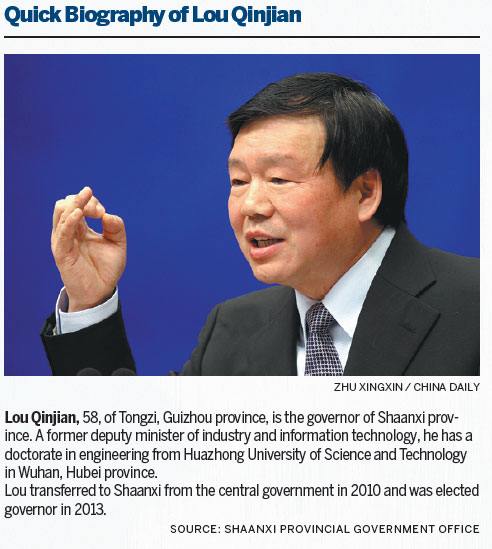
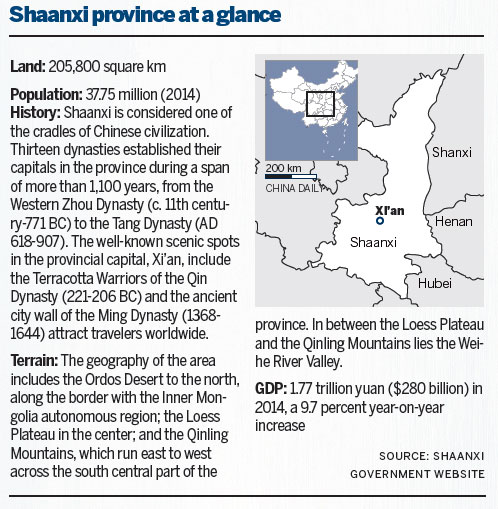
(China Daily USA 10/07/2015 page5)
- Russian warplanes hit IS targets in Syria
- Senior US envoy to visit Japan, S Korea, China
- Russia, US agree to cooperate in solving Syria crisis: Russian FM
- Iranian President calls Iran deal victory over war
- LatAm experts praise Xi on yuan, globalization
- Evidence found of summertime water flows on Mars: study
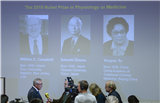
 China wins first Nobel in medicine
China wins first Nobel in medicine-
 Gary Locke: Candor key to relations
Gary Locke: Candor key to relations -
 Saving Chinese folk songs
Saving Chinese folk songs 
 Candlelight vigil for Oregon shooting victims
Candlelight vigil for Oregon shooting victims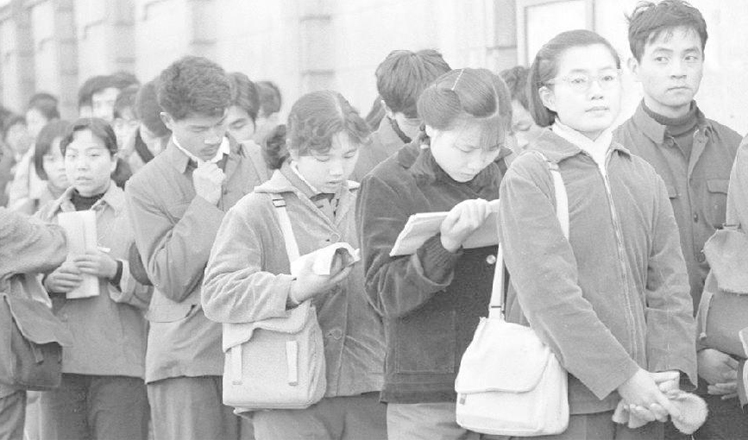
 Chinese people's pursuits in different eras
Chinese people's pursuits in different eras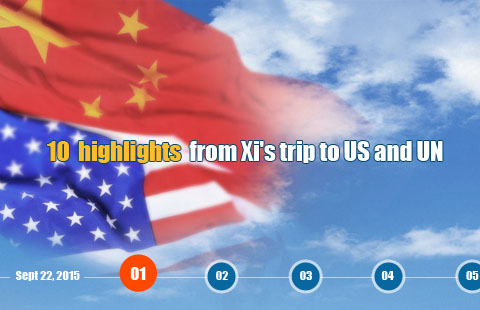
 Ten highlights from Xi's trip to US and UN
Ten highlights from Xi's trip to US and UN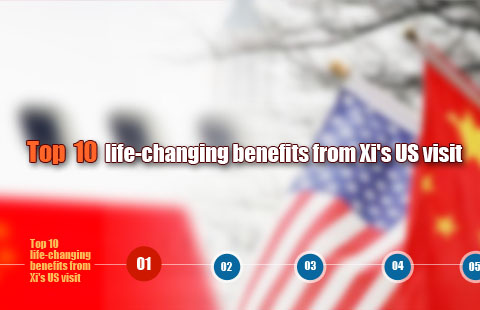
 Top 10 life-changing benefits from Xi's US visit
Top 10 life-changing benefits from Xi's US visit-
 Highlights of President Xi's speeches at UN
Highlights of President Xi's speeches at UN
Most Viewed
Editor's Picks

|

|

|

|

|

|
Today's Top News
Tu first Chinese to win Nobel Prize in Medicine
Huntsman says Sino-US relationship needs common goals
Xi pledges $2 billion to help developing countries
Young people from US look forward to Xi's state visit: Survey
US to accept more refugees than planned
Li calls on State-owned firms to tap more global markets
Apple's iOS App Store suffers first major attack
Japan enacts new security laws to overturn postwar pacifism
US Weekly

|

|
